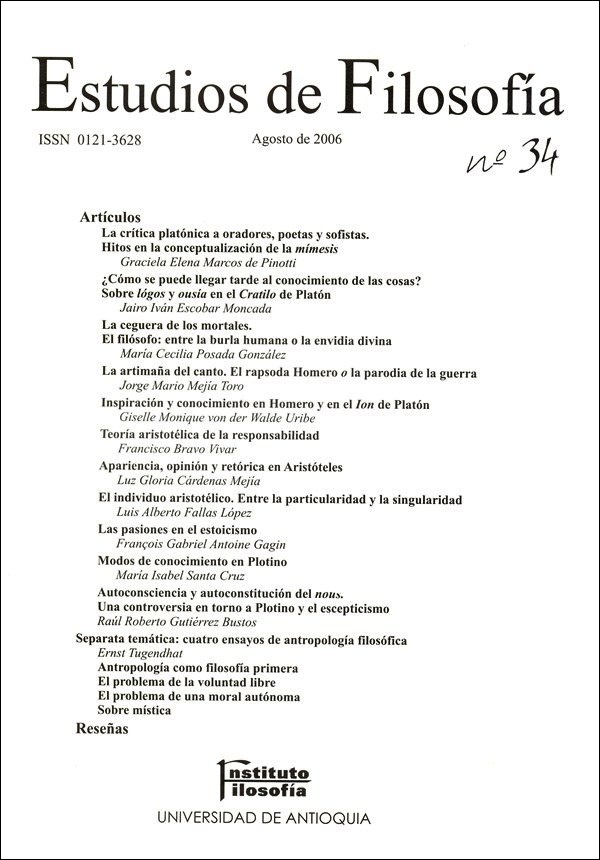La artimaña del canto. El rapsoda Homero o la parodia de la guerra
DOI:
https://doi.org/10.17533/udea.ef.12777Palabras clave:
Homero, Ilíada, aedo, rapsoda, astucia, escritura, oficio, palabra, parodia.Resumen
Partiendo de algunos estudios filológicos contemporáneos sobre el significado del nombre rapsoda, que recogen las interpretaciones más antiguas del mismo y llegan a vincularlo con el ardid, la trama y la artimaña, intentamos derivar la concepción de la poesía que Homero materializa en la Ilíada, lo que exige entonces decidir si el rapsoda es el aedo compositor o sólo el recitador de la obra consumada. Y el sentido de su acto de coser cantos o cantar con un cayado depende, a su vez, de si la transmisión oral del poema equivale o no a la inexistencia de la composición escrita, y de si ésta es simple redacción y conservación o, antes bien, partitura esencial de la poesía.
Descargas
Citas
Bibliografía básica
Homero, Iliada. Madrid, Gredos, 1991.
____________ . Iliada (griego-castellano). México, UNAM, 1996-1997.
____________ . La Odisea. Barcelona, Verón, 1972.
Complementaria
Bergk. Griechische Literaturgeschichte, I (sin referencia bibliográfica).
Bollack, Jean. La Gréce de personne. Paris, Seuil, 1997.
____________ . Poesía contra poesía. Celan y la literatura. Madrid, Trotta, 2005.
Celan, Paul. ‘Todesfuge”, Gedichte, 1. Frankfurt a. M., Suhrkamp, 1986.
Crespo Giiemes, Emilio. “Introducción”, Iliada (ed. cit.).
Dalfen, Joachim. Polis und Poiesis. Die Auseinandersetzung mit der Dichtung bei Platon und seinen Zeitgenossen. München, Fink Verlag, Humanistische Bibliothek, Band 17, 1974.
Finley, Moses I. Los griegos de la antigüedad. Barcelona, Labor, 1994.
Fränkel, Hermann. “Griechische Wörter” (Rhapsödös), Glolta, 14,1925.
____________. Poesía y filosofía de la Grecia arcaica, Madrid, Visor, 1993.
Havelock, E. A. Prefacio a Platon. Madrid, Visor, 1994.
Kirk, G S. Los poemas de Homero. Barcelona, Paidós, 1985.
Mejía T., Jorge M. “Cenotafio”, Estudios de filosofía, N° 26, agosto de 2002, Universidad de Antioquia, Medellín.
Meyer, Eduard. "Die Rhapsoden und die homerischen Epen”, Hermes, 53, 1918. Nietzsche, Friedrich. La genealogía de la moral. Madrid, Alianza, 1972.
Patzer, Harald. “Rhapsödös”, Hermes, 80, 1952.
Píndaro. Epinicios. Madrid, Alianza, 1984.
Reale, Giovanni. Platon. En búsqueda de la sabiduría secreta. Barcelona, Herder, 2001.
Redfield, James. La tragedia de Héctor. Barcelona, Destino, 1992.
Schadewaldt, Wolfgang. Von Homers Welt und Werk, Stuttgart, 1951.
Schmid, W. Geschichte der griechische Literatur, I, 1929. DOI: https://doi.org/10.1515/bgsl.1929.1929.53.305
Vidal-Naquet, Pierre. El mundo de Homero. Buenos Aires, FCE, 2001. Wilamowitz, Ulrich. Die Ilias und Homer (sin referencia bibliográfica).
Descargas
Publicado
Cómo citar
Número
Sección
Categorías
Licencia
Derechos de autor 2006 Jorge Mario Mejía Toro

Esta obra está bajo una licencia internacional Creative Commons Atribución-NoComercial-CompartirIgual 4.0.
Los autores que publican en Estudios de Filosofía acuerdan los siguientes términos:
1. El Autor retiene el copyright del "Artículo", por el cual se entiende todos los objetos digitales que pueden resultar de la subsiguiente publicación o distribución electrónica.
2. En conformidad con los términos de este acuerdo, el autor garantizará a Estudios de Filosofía como Editor el derecho de la primera publicación del artículo.
3. El Autor le concederá al Editor un derecho perpetuo y no-exclusivo, así como una licencia de la misma clase, de publicar, archivar y hacer accesible el Artículo parcial o totalmente en todos los medios conocidos o por conocerse, derecho y licencia que se conocen como Creative Commons License Deed. Atribución-No Comercial- Compartir igual CC BY-NC-SA o su equivalente que para efectos de eliminar toda duda, le permite a otros copiar, distribuir, y transmitir el Artículo bajo las siguientes condiciones: (a) Atribución: Se deben reconocer los créditos de la obra de la manera especificada por el Autor a Estudios de Filosofía, pero no de una manera que sugiera que tiene su apoyo o que apoyan el uso que hace de su obra. (b) No Comercial: No se puede utilizar el Artículo para fines comerciales.
4. El Autor puede realizar otros acuerdos contractuales no comerciales para la distribución no exclusiva de la versión publicada del Artículo (v. gr. ponerlo en un repositorio institucional o publicarlo en un libro) con la condición de que haga el debido reconocimiento de su publicación original en Estudios de Filosofía.
5. A los Autores se les permite y Estudios de Filosofía promueve publicar en línea (online) la versión pre-impresa del Artículo en repositorios institucionales o en sus páginas web, antes y durante la publicación, por cuanto que puede producir intercambios académicos productivos, así como una mayor citación del Artículo publicado (ver The Effect of Open Access). Dicha publicación durante el proceso de producción y en la publicación del Artículo se espera que se actualice al momento de salir la versión final, incluyendo una referencia a la URL de Estudios de Filosofía.















